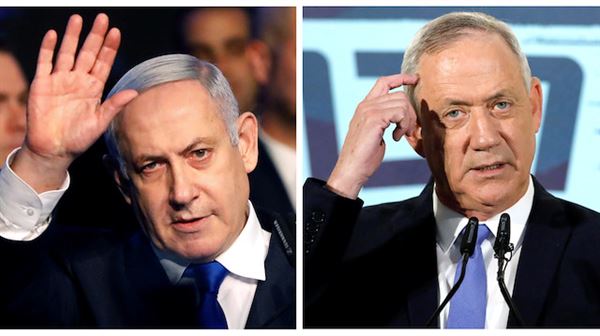Israeli Prime Minister Benjamin Netanyahu and his main political rival Benny Gantz, the leader of the Blue and White alliance, have failed to form a g
Israeli Prime Minister Benjamin Netanyahu and his main political rival Benny Gantz, the leader of the Blue and White alliance, have failed to form a government, raising the specter of a third early election in one year.
Netanyahu had been unable to form a government following previous elections in April and September.
On Thursday, President Reuven Rivlin assigned the duty of establishing a coalition government to parliament as Netanyahu and his chief challenger Benny Gantz, head of the Blue and White alliance of centrist parties, failed the task.
In the 21-day period granted to parliament, prospects seem difficult for lawmakers to agree on a new government name. Netanyahu, who enjoys the support of right-wing parties, is the best-posiitioned candidate to form a coalition.
Netanyahu must convince either former defense minister Avigdor Lieberman, the leader of the right-wing Yisrael Beytenu, or Gantz to form a coalition government.
Blue and White leaders are more likely to continue their efforts to form a coalition on their own. However, experts suggest that the possibility of forming a coalition government under the leadership of Gantz remains elusive.
Lieberman, who blamed Netanyahu and Gantz for failing to form a coalition government, announced at a press conference earlier this week that he would not support either leader.
Still, analysts point to the possibility of a government headed by Netanyahu if Lieberman agreed to join it.
In the case of failure by the Knesset to form a coalition government, Israelis are expected to cast their ballots for a third snap ballot within a year, no later than March 2020.
Meanwhile, Netanyahu and Gantz blame each other for the failure to form a coalition government as they they wage a propaganda war in order not to be seen as the leader who led the country to early-election deadlock.
In case of a third poll, Netanyahu will utilize a recent decision taken by the U.S. regarding Israeli settlements.
On Monday, U.S. Secretary of State Mike Pompeo softened Washington’s stance on Israeli settlements, saying Washington would no longer consider them illegal, backpedaling from some four decades of U.S. policy.
A similar move was made in late March before April’s early elections when U.S. President Donald Trump signed a presidential proclamation officially recognizing the highlands on the border with Syria as Israel’s territory, during a meeting with Netanyahu at the White House.
Yet, Netanyahu faces pressure over fraud charges as Israeli Attorney General Avichai Mandelblit indicted Netanyahu on charges including bribery, fraud and breach of trust on Thursday.
Following the attorney general’s decision, Netanyahu must apply to the Knesset, the country’s parliament, with a request for immunity.
But even if he does, a decision is not likely to be made quickly, as a coalition government has yet to be formed.
Also, in line with Israeli laws, the prime minister has the right to maintain his position until being found guilty, even when indicted. Hence, there are no conditions that would prompt Netanyahu to step down at this point.
